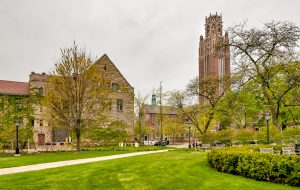Prepping for College Admission Changes
The landscape has changed, and area private schools help navigate the terrain.
 As parents of any college-bound student know, the process of helping your child find the right college can be a challenge in the best of times. The pandemic years certainly complicated the process. And this past June, the U.S. Supreme Court added to the mix when it struck down race-conscious college admissions, effectively ending affirmative action programs. Many believe this decision will have a domino effect on college admissions, adding more uncertainty to an already daunting process.
As parents of any college-bound student know, the process of helping your child find the right college can be a challenge in the best of times. The pandemic years certainly complicated the process. And this past June, the U.S. Supreme Court added to the mix when it struck down race-conscious college admissions, effectively ending affirmative action programs. Many believe this decision will have a domino effect on college admissions, adding more uncertainty to an already daunting process.
While the Supreme Court’s decision technically affects only the use of racial preferences, it hasn’t stopped speculation around what other admission strategies may end next. These existing preferences include practices that tend to favor white and wealthy applicants, such as legacy admissions, athletic recruitment and standardized testing moving from test-optional to test-not-at-all.
So, is this an upheaval in college admissions or just another shift in an ever-evolving process to find that best match of college and student? And what are local private and independent schools doing to respond?
Change and Uncertainty
“The college admission landscape has evolved significantly in recent decades, and we feel that this [latest Supreme Court] ruling will drive continued evolution,” said Chris Torino, Assistant Head of School at Newtown Square’s Episcopal Academy.
Lauren Savage-Miller, Director of College Counseling at Villa Maria Academy in Malvern, shared this view. “Since Covid, college applicants have had to pivot left and right,” she said.
One of the significant recent changes in college admissions was eliminating the requirement of standardized test scores. After test centers closed during the pandemic and with no online option available, admissions offices were forced to make tests optional. Yet, that decision continues despite test centers having reopened and the introduction of a new digital option. According to FairTest, a nonprofit organization working to improve standardized testing, scores will remain optional or not required at 78% of four-year higher education institutions through 2024.
Savage-Miller, who worked as a college admissions officer for eight years before coming to Villa Maria, knows that an admissions factor doesn’t just go away. “If you don’t submit test scores, that’s a whole section of the application colleges can’t weigh you on. So, what takes that place?”
On the other hand, Director of College Counseling Alan Paynter at Sacred Heart Academy in Bryn Mawr, believes the decision to end affirmative action policies will have a broad impact all on its own. But his bigger concern right now is how to keep it from stressing his students. “Ultimately, I think everyone is affected — students, their families, high schools,” he said. “I think when the smoke clears, diversity will be impacted at schools, specifically at these elite schools.”
In the meantime, counselors still have students they’re trying to match with dream schools. “We are all running around — and everyone’s looking at the application and trying to decide how they are going to get that leg up,” Paynter said.
New Role of the Essay
 Many experts are now suggesting the essay may be the way to keep diversity and its impact in the admissions process. In fact, Chief Justice John Roberts said as much in the majority opinion: “Nothing prohibits universities from considering an applicant’s discussion of how race affected the applicant’s life, so long as that discussion is concretely tied to a quality of character or unique ability that the particular applicant can contribute to the university.”
Many experts are now suggesting the essay may be the way to keep diversity and its impact in the admissions process. In fact, Chief Justice John Roberts said as much in the majority opinion: “Nothing prohibits universities from considering an applicant’s discussion of how race affected the applicant’s life, so long as that discussion is concretely tied to a quality of character or unique ability that the particular applicant can contribute to the university.”
I posed the question to Paynter: Are essays the answer?
“I’ve been thinking about this,” he said. “My worry is that students won’t write about what they want to write about because they feel the need to discuss [diversity]. What does that mean? Does the student not tell an amazing story they wanted to tell because they feel pressure to show something else?” He thinks not. “We’re talking about young people being hurt in an already stressful process,” he said. “That’s one more layer of stress that we just don’t want to see.”
Episcopal Academy’s Torino is also focused on continuity. “Our college counseling mission will remain the same, regardless of this or future changes,” he said.
Excellence, Authenticity, Engagement
So, what does all this mean — changes or no changes, how do students stand out in an increasingly competitive environment?
“Academic excellence proves essential,” said Torino, who encourages students to prioritize their high school transcript and themselves. “It’s important for students to put forth their authentic selves in their application,” he said. “Own your process,” agreed Paynter. “If there’s something you want to shine, make a point to call attention to it.”
For Savage-Miller, the key to standing out starts before the application process. This advice isn’t limited to class selection or extracurricular activities, which are, of course, important. It also includes school selection. “I’m a big advocate for students being excited about the list of schools they apply to,” she said.
When students are excited about a school, they’re going to be eager to research it, eager to answer the questions, and eager to go beyond, Savage-Miller said. “Nothing is optional here.” She encourages students not only to write that extra essay but to do all the little things, too. Take a campus tour. Open the emails. Watch the video. “Colleges are tracking that,” she said. “If there’s an interview opportunity, take it. Any opportunity to get in front of an admissions official, take it.”
Paynter agreed. “Take advantage of every opportunity that’s available to you at those schools to show your interest. Be a name,” he said. Then, relax and enjoy the process.
“Try to push the stress aside,” said Paynter, who visited 63 colleges helping his three kids settle on their lists. “I had a blast.” Get yourself a T-shirt and remember this is a two-way street, he said. “Colleges will spend more time and money trying to attract you than you will on them.”
Then get ready for the next exciting chapter of your life!
Six Tips from the Experts
Here’s some final advice to students and parents as the application season begins.
 Stay true to yourself. “It’s important for students to put forth their authentic selves in their application,” said Torino. “Colleges value students who can speak with enthusiasm about their high school experiences and with depth regarding their rich academic and extracurricular successes.”
Stay true to yourself. “It’s important for students to put forth their authentic selves in their application,” said Torino. “Colleges value students who can speak with enthusiasm about their high school experiences and with depth regarding their rich academic and extracurricular successes.”
Work ahead. “Start the process early and break your timeline into manageable and attainable tasks,” suggested Torino. At Villa Maria, students come into their senior year with their essays completely written, a technique Savage-Miller recommends. “We’ve found it really helps their stress level,” she said.
Apply to more schools. “If you asked me last year, five to seven schools would be enough. This year, eight to 10,” said Savage-Miller. Colleges don’t have enough staff to get through all the applications, so students are seeing more deferred decisions, she explained. It doesn’t mean students won’t get in, but that the school hasn’t had a chance to review the application. It can be a stressful response for the student. “It’s really for their comfort.”
Work your connections. “I value what those recommendations share,” said Paynter. “Our kids are humble. They don’t want to brag about themselves, so let someone else do that for you.”
Build a team. “Recognize you don’t have to go at this alone,” said Paynter, who was one of the first in his family to go to college. Rely on parents, counselors, teachers — whoever you need to help you through your application process. Then keep building that team. Paynter said once he got that acceptance letter, “I added more people to the team that helped me get through college.”
Keep perspective. Despite the thousands of amazing colleges, there are only a few dozen institutions that accept fewer than 10% of their applicants. Not everyone is getting into those colleges. “That doesn’t make you a bad student,” said Paynter. “I want students to come out of this process with their head held high, knowing that they are going to make a difference in this world.”
